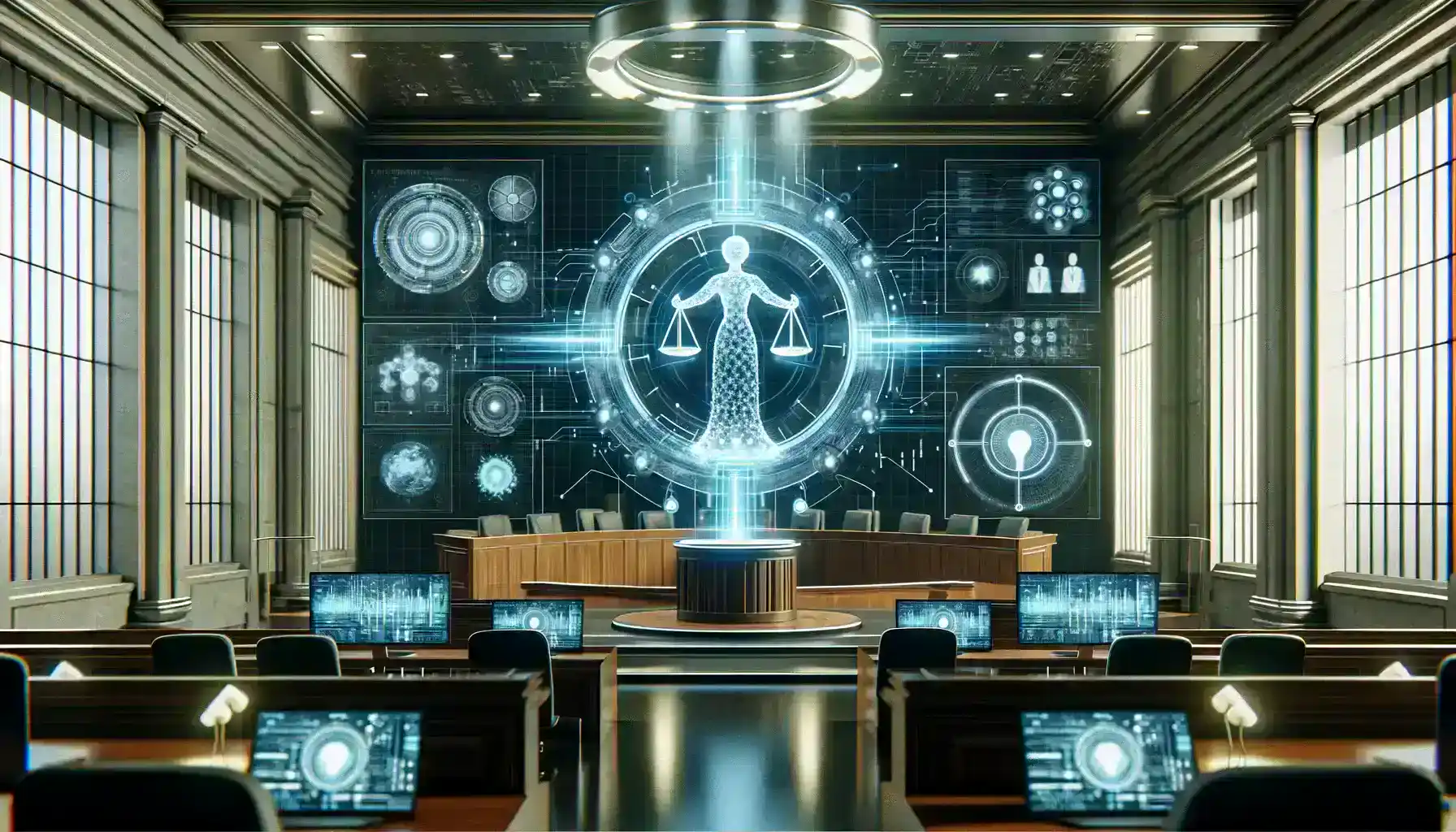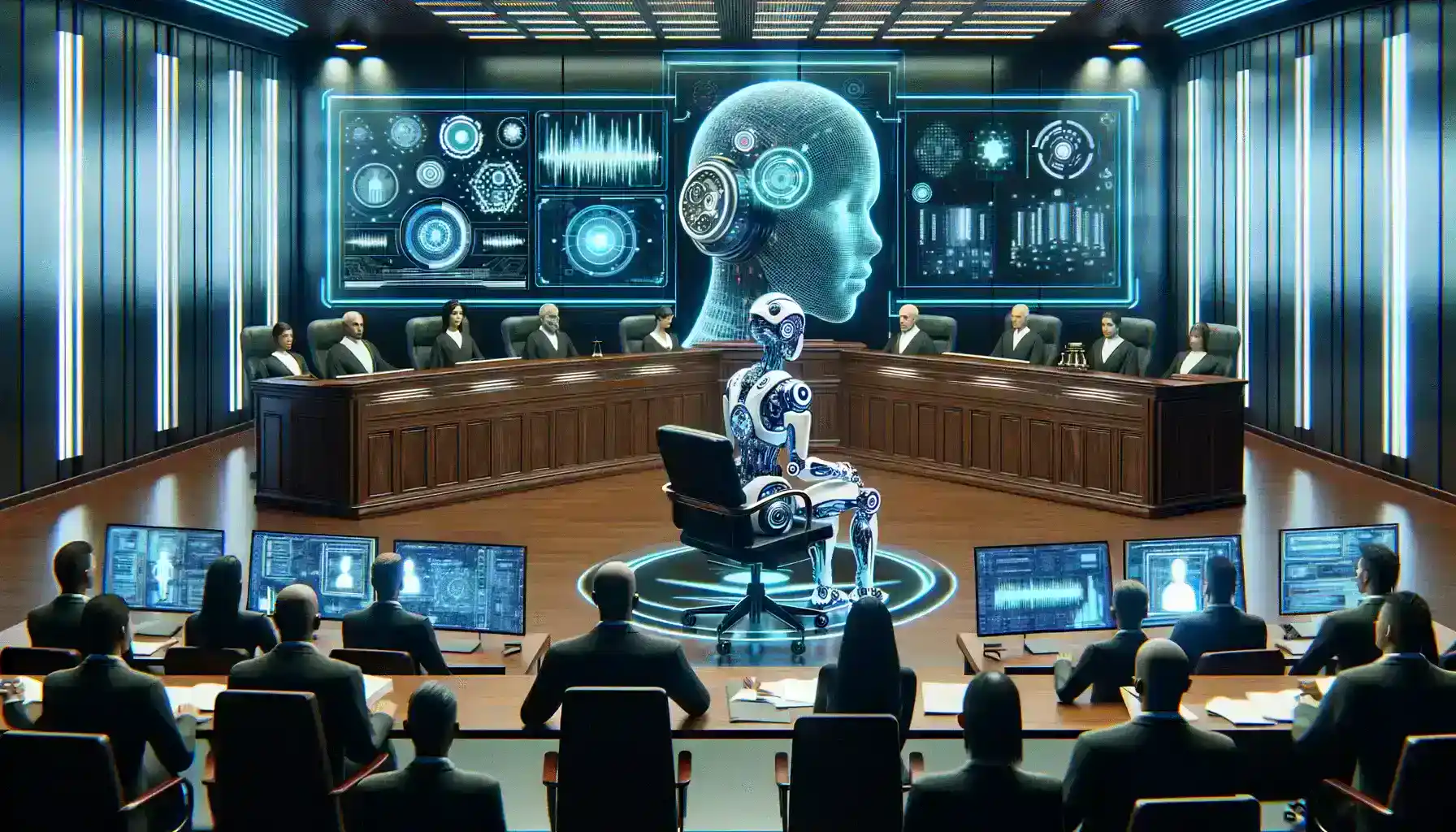Table of Contents
The advent of Artificial Intelligence (AI) technology has marked a pivotal moment in the evolution of how we approach the administration of justice. It’s akin to a doorway opening into a realm of profound transformation, one that holds the potential not merely to modernize but to fundamentally revolutionize the very bedrock principles upon which the justice system is constructed: efficiency, accessibility, and fairness.
The convergence of AI technology in the justice system represents a pivotal juncture where the capabilities of advanced technology meet the imperatives of justice. At its core, it signifies the fusion of artificial intelligence and the intricate machinery of the justice system, an alliance that promises to reshape how we deliver justice in our societies.
However, this transformative journey, akin to a voyage into uncharted waters, is by no means free of formidable challenges. The infusion of AI into an age-old institution such as the justice system has brought forth complexities and questions that demand careful consideration and thoughtful navigation.
The justice system, deeply ingrained as an essential pillar of any society, has long relied on the discernment of human judgment, the expertise of legal professionals, and the meticulous observance of due process. It has been a domain where centuries of jurisprudence, ethics, and legal tradition have culminated in a framework designed to mete out justice impartially and equitably.
Yet, this transformative journey is not without its challenges. The application of AI in the justice system introduces a host of complex issues. We must grapple with concerns of bias and fairness, data privacy and security, accountability and responsibility, public trust and acceptance, and the adaptation of the existing workforce to this new paradigm.

AI in the Justice System
AI in the Justice System refers to the application of Artificial Intelligence (AI) technology within the legal and judicial domains. This integration involves the use of AI algorithms and tools to assist in various aspects of the justice system, including law enforcement, legal research, evidence analysis, and decision-making processes.
AI in the justice system holds the potential to improve efficiency, accuracy, and accessibility while addressing challenges related to bias, data security, accountability, and public trust. This concept represents the intersection of advanced technology and the pursuit of fair and effective justice administration.
In this article, we embark on an exploration of this remarkable fusion of AI technology and the justice system, with a keen focus on the pivotal keyword, “AI in the Justice System.” We will navigate through the challenges that arise at this juncture and shed light on the corresponding opportunities that emerge.
Through this journey, we aim to gain a deeper understanding of the intricate balance between tradition and innovation, and how, with careful consideration, we can steer toward a future where the justice system is not just more efficient and accessible but also more equitable and just.
AI in the Justice System: Challenges and Opportunities
Bias and Fairness
The Challenge: AI systems, remarkable as they are, have the potential to inherit and perpetuate biases ingrained within the data they are trained on. This challenge becomes particularly acute when historical arrest data, for instance, carries systemic biases against certain racial or socioeconomic groups. AI systems trained on such data may inadvertently perpetuate these biases, potentially leading to unfair targeting of marginalized communities within the justice system.
The Opportunity: By adopting XAI principles, Amazon could have ensured that the decision-making process of the AI system was interpretable. This would allow candidates to understand why they were or weren’t selected, increasing transparency and trust in the hiring process.
IBM Watson OpenScale is an AI fairness and explainability tool that can be integrated with various AI models to monitor and address bias in real-time. It can be used to ensure fairness in AI systems used for tasks like bail and sentencing recommendations.

Privacy and Data Security
The Challenge: AI in the justice system, at its core, is entrusted with an extensive repository of highly sensitive personal information. This repository includes everything from criminal records to court documents, and safeguarding this treasure trove of data is of paramount importance. As we usher in the era of AI in the justice system, the significance of data privacy and security becomes even more pronounced due to AI’s insatiable appetite for data.
The Opportunity: The captured footage from body-worn cameras contains sensitive information about individuals, including their faces, voices, and interactions with law enforcement. Robust encryption techniques are employed to secure this data, both when it’s stored (data at rest) and when it’s transmitted (data in transit). This encryption ensures that even if the data is compromised, it remains indecipherable to unauthorized individuals or cyber attackers.
Homomorphic encryption is an advanced cryptographic technique that allows computations to be performed on encrypted data without decrypting it. In the context of AI in the justice system, homomorphic encryption can be applied to ensure that data remains confidential during analysis. It can be used to securely analyze encrypted legal documents, case records, or surveillance footage without exposing the raw data to the AI system.
Accountability and Responsibility
The Challenge: AI in the justice system revolves around the complex web of interactions and decisions when AI-driven systems lead to errors or injustices. This multifaceted challenge comes to the forefront when, for instance, an AI algorithm incorrectly convicts an innocent person. Accountability may not rest solely on one party but on a combination of these entities. Collaborative responsibility entails acknowledging that different stakeholders must work together to ensure that AI-driven decisions are accurate, fair, and just.
The Opportunity: Accountability and responsibility in AI in the Justice System, it is imperative to seize the opportunity presented by the establishment of comprehensive ethical and legal frameworks. In the European Union, the General Data Protection Regulation (GDPR) represents an attempt to address accountability in AI and data processing. Under GDPR, organizations that use AI systems are accountable for ensuring that these systems comply with data protection regulations.
IBM AI Fairness 360 (AIF360). AIF360 is an open-source toolkit that provides a comprehensive suite of metrics and algorithms for detecting and mitigating bias in AI models. It offers transparency and auditing capabilities, making it a valuable tool in ensuring accountability and responsibility within the AI in the Justice System context.
Public Trust and Acceptance
The Challenge: Incorporating AI into the justice system is a significant undertaking, and its success is closely tied to the level of trust and acceptance it garners from the public. Concerns related to fairness, transparency, and reliability can act as significant barriers to the widespread adoption of AI solutions within the justice system.
The Opportunity: Informing citizens about the advantages and limitations of AI within the justice system is a foundational step. Public awareness campaigns should be designed to demystify AI, making it accessible to individuals from all walks of life. These campaigns should not only highlight the potential benefits of AI, such as improved efficiency and accuracy in legal processes but also acknowledge its limitations and potential pitfalls.
NLP technologies can be used to create educational materials, including interactive online courses or chatbots, that explain legal concepts related to AI in a user-friendly manner.

Workforce Adaptation
The Challenge: The rapid integration of AI technology within the justice system signifies a monumental shift that necessitates adaptation from the existing workforce. This transformation, while promising enhanced efficiency and decision-making, also brings forth a host of challenges, including the pervasive fear of job displacement among current justice professionals. Here, we delve into this challenge within the context of “AI in the Justice System.”
The Opportunity: As AI becomes more integrated into the justice system, professionals will require guidance on the ethical and legal implications of AI-driven decisions. Training programs should include modules on ethical considerations and adherence to legal standards in AI utilization. The future of justice relies on a harmonious synergy between human expertise and AI capabilities, ensuring that the benefits of AI are harnessed while preserving the essential role of justice professionals.
CallidusAI is an AI-powered legal research tool that helps legal professionals find relevant case law and legal documents quickly.
Conclusion
The integration of Artificial Intelligence (AI) technology into the justice system, with a central focus on “AI in the Justice System,” signifies a pivotal chapter in the evolution of our approach to justice administration. It represents a profound shift that holds the potential to modernize and, in many ways, revolutionize the very essence of justice: efficiency, accessibility, and fairness.
Within these challenges lie remarkable opportunities. We have illuminated these opportunities, such as the establishment of ethical and legal frameworks, public education and trust-building initiatives, and the empowerment of the existing workforce through upskilling and collaboration. These opportunities provide a roadmap for harnessing the power of AI in a way that augments, rather than diminishes, the fundamental principles of justice.
The fusion of AI technology and the justice system is not merely a technological advancement but a moral and societal imperative. It is a journey that demands our collective commitment to upholding the principles of justice, fairness, and accountability as we harness the transformative power of AI in our pursuit of a more just and equitable world.